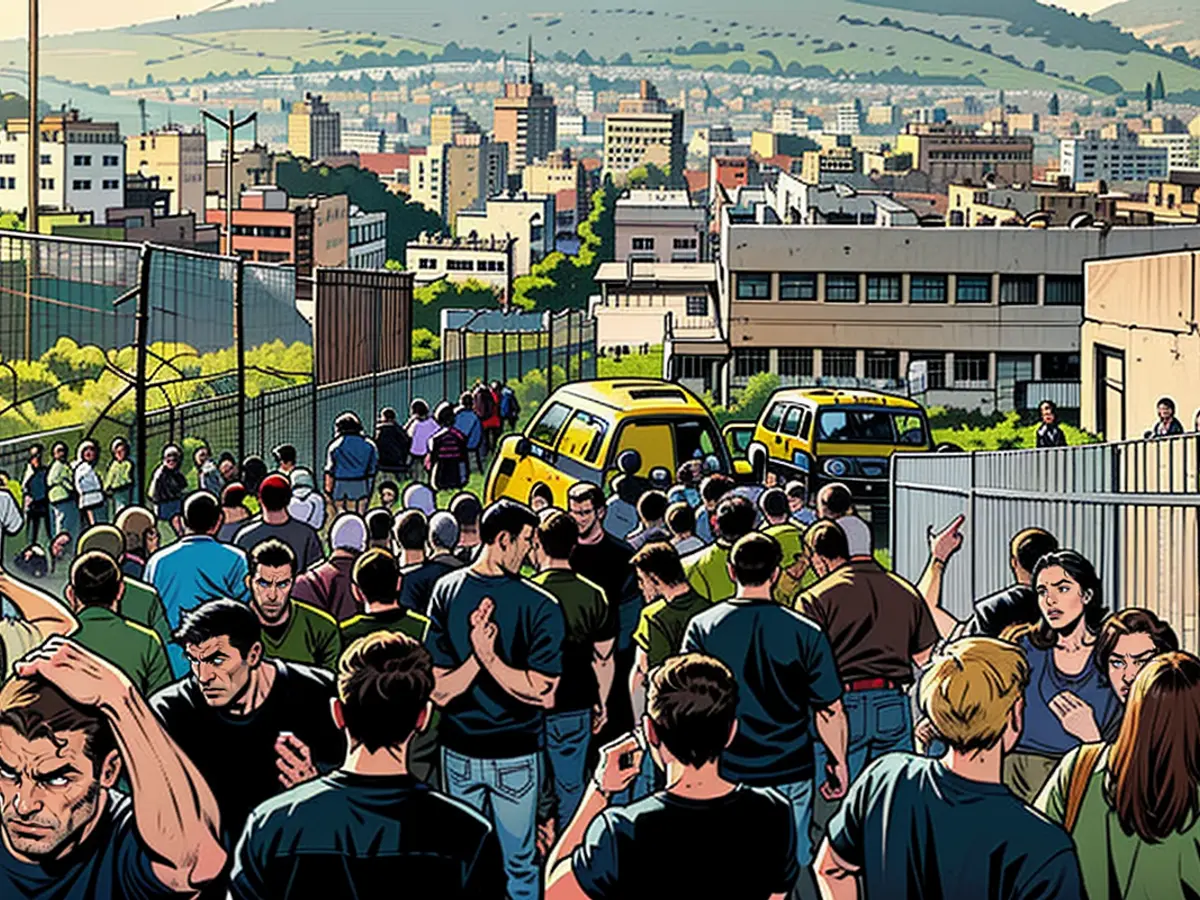What the threat of escalation in Lebanon is
An Israeli retaliation strike following the rocket attack on the Golan is likely only a matter of time. Behind the scenes, the USA is working to cool down the situation. While the danger of an open war with Hezbollah is as high as it has been in a long time, other scenarios are also possible.
Perhaps this was the mistake that has been feared for months. The rocket attack on the Golan with twelve dead children and teenagers could be the event that triggers a new, open war between Israel and Hezbollah in Lebanon. US diplomats are hurriedly working to stabilize the situation. The waiting game has begun again in Lebanon - for Israel's counterattack, possibly near the capital Beirut, and for how Hezbollah will react afterwards.
It is considered certain that Israel will strike back hard following the most serious attack since the start of hostilities with Hezbollah on October 8 last year. At the same time, both sides appear not to be interested in further escalating their hard-fought battles, which have been ongoing for almost ten months. On the Lebanese side, more than 100 civilians and 360 Hezbollah members have been killed, while on the Israeli side, about 20 soldiers and more than 20 civilians have died. Around 150,000 people on both sides of the border have already had to leave their homes.
USA in "ongoing discussions"
The challenge now is to keep the retaliation strike approved by the Israeli security cabinet below the threshold of a full-scale war. Washington is working behind the scenes to calm things down. A spokesperson for the US National Security Council says they are in "ongoing discussions" with the Israeli and Lebanese sides. They blame the attack on the Golan on Hezbollah, stating that "it was their rocket, launched from an area under their control." Hezbollah has denied any responsibility.
There are signs that Hezbollah may have accidentally hit the Druze-populated town of Majdal Shams. "The assumption of a misguided rocket is much more credible than Hezbollah deciding to attack a soccer field," says Eli Hanna, a Lebanese former general, in the newspaper "L'Orient-Le Jour". The fact that the militia claimed responsibility for several other attacks against Israeli military targets nearby also supports this. The Druze in the Golan, annexed by Israel, who feel closer to Syria than Israel, would be an unusual target for the militia.
Druze demand counterstrike
The Druze minority, mourning the loss of twelve children and teenagers aged 10 to 16, is deeply upset and demanding a strong counterstrike. Israeli representatives told the newspaper "Yediot Ahronot" that they expect a "limited but significant" reaction from Israel. Possible options include an attack on Lebanese infrastructure, a major Hezbollah weapons depot, an "iconic site that has not been targeted before", or the killing of high-ranking Hezbollah representatives.
An analyst from the "Israel Hayom" newspaper wrote that the dilemma for Israel's army now is to achieve the desired effect without creating a dangerous dynamic that escalates the situation into a full-blown war. Such a development could lead to a new conflict with Iran and its helpers in the region, including militias in Syria, Iraq, and Yemen, which could negatively impact Israel's goals in the Gaza war and efforts to free more than 100 hostages in the Gaza Strip, many of whom are feared dead. The already-stalled talks about a hostage deal could collapse in a new war with Hezbollah.
Perhaps the reaction could unfold similarly to April, when Iran - the main ally of Hamas in Gaza and Hezbollah in Lebanon - directly attacked Israel with drones and rockets for the first time, following an alleged Israeli attack on an Iranian consular building in Syria. This attack was large and symbolic enough for its own audience, but it also followed a clear and calculable choreography that prevented a full-blown regional conflagration.
"Every city" in Israel at risk
Israel and Hezbollah's last war was in 2006. Israel's army bombed Beirut airport and destroyed large parts of the coastal city and the south of the country. Now, nearly 20 years later, a war would have even more dramatic consequences for both sides. Hezbollah now has about 150,000 rockets, drones, and cruise missiles - about ten times its arsenal in 2006. "Every city and village in Israel is at risk," writes the U.S. think tank Brookings. The militia could also significantly disrupt Israel's power grid.
If the conflict escalates, Iran's other allies could also strengthen their attacks on Israel, including the Houthi militia in Yemen, whose drone attack in Tel Aviv recently claimed Israel's first casualty. Israel retaliated in Yemen for the first time. Ankara's rhetoric is also becoming sharper, after Turkish President Recep Tayyip Erdogan threatened that Turkey would "intervene" in Israel like it did in Nagorno-Karabakh and Libya. However, it is generally doubted that Turkey is actually considering military action against Israel.
Former Israeli military intelligence chief Tamir Hayman wrote that Hezbollah made a serious mistake with its attack on the Golan. "Harming children, especially Druze on the Golan Heights, puts them in a negative light in Lebanon," explained the head of the INSS think tank. "This, in addition to the anger of many Lebanese over the fact that their country is being dragged into a war with Israel that they see as completely unnecessary." In this context, Israel can afford to wait a bit before reacting. "Time is on our side. It's better to let Hezbollah stew in its own juice for a while."
The United States, through its diplomats, is actively involved in attempting to deescalate the situation, engaging in ongoing discussions with both Israel and Lebanon. Recognizing the potential for a significant retaliation from Israel, Hezbollah's Druze supporters in the Golan are demanding a strong counterstrike in response to the rocket attack that claimed the lives of twelve children and teenagers.








